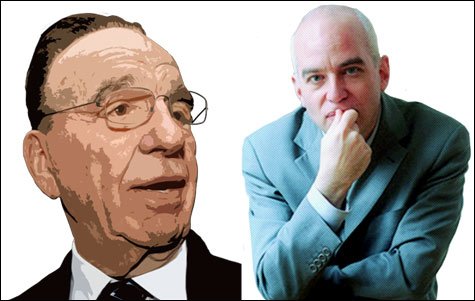
THE FOX AND THE WOLFF: For a visionary, Rupert Murdoch (left) has “very little vision,” while Michael Wolff makes for an almost subversive choice to be Murdoch’s official biographer. |
| The Man Who Owns the News | By Michael Wolff | Broadway | 464 pages | $29.95 |
Rupert Murdoch was sipping from a glass of coconut water, a favorite of his, meant to increase electrolytes, when he suddenly began to share with his biographer, Michael Wolff, a genetic theory: the basic problem with Muslims is that they married their cousins."I heard him say it," recalls Wolff, "and it's, like, 'Where did that come from?' "
At another point, still tickled by his success with the Dow Jones deal, Murdoch touched upon his desire to get his hands on the New York Times as his next and, given his age, possibly last great acquisition, after the Wall Street Journal (WSJ). Perhaps Murdoch forgot his desire to acquire the paper — described in the book as "his favorite train wreck" — would be on the record.
But then again, even if he did realize he had just blundered, Murdoch's not the type that would care too much — dwelling on the past is not something he cares to do, mainly because the past is the past. No point in looking for an explanation or asking "why" something was said or done; Murdoch has no demonstrated ability to do so. Which, obviously, presents an odd dilemma for someone writing a detailed biography mapping the career trajectory, family history, and motives driving the last great newsman of our time. And it raises the even bigger question of why the notoriously secret media mogul would want to participate with such candor in the writing of his biography at all.
Lowering the gate
In the current media universe, Murdoch plays the role of both a hero and a villain, regularly acquiring new outlets that seem to thrive when all others teeter on the edge of failure. His multimedia News Corporation, better known as News Corp., churns out countless films, shows, and books each year, through its ownership of the New York Post, the WSJ, Fox News, and Twentieth Century Fox — not to mention a number of other news and entertainment entities across the United States, United Kingdom, and Australasia. Still, Murdoch is perhaps best known for his role in the news, rather than entertainment, industry — both for helping to sustain it and debasing it at every turn.
Murdoch has been dogged by charges that he regularly imposes his conservative views on the editorial pages of his papers, for instance — allegations that notably made their way into a 2004 documentary and companion book, Outfoxed: Rupert Murdoch's War on Journalism. And, of course, there's the image of Murdoch as the sinister once-and-future king, commanding the empire below him with an iron fist, which, for the most part, is largely supported by the man's actions as a CEO. For example, Murdoch told Wolff one afternoon after acquiring the WSJ, "We might have to let people go just to make a point."
Yet for all the mud that has been slung at the septuagenarian media mogul, rarely has he fired back or offered insight (such as can be revealed by someone lacking self-awareness) into his motivations — until now. Even stranger, now that Murdoch has chosen finally to open himself up to the public, he has done so with a biographer who has slammed him in the past: journalist Wolff, for whom Murdoch agreed to lower the gate, with no leash or editorial oversight on the outcome attached.
"This isn't a man who reads a lot of books," says Wolff, "so I'm not sure he had a clear context for thinking about this. Once he sees it [the biography], he may be embarrassed and possibly appalled by its personal nature."
Still, Murdoch won't be the sole judge on how the book — The Man Who Owns the News: Inside the Secret World of Rupert Murdoch — turns out. Instead, Wolff says it's likely that Murdoch will wait for other people's reaction before offering his own take on it. If it has a good effect, then Murdochian logic dictates it's good.
'He's a newspaper guy'
Wolff makes for an almost subversive choice to be Murdoch's official chronicler. Read any book, column, interview, or blog post by Wolff — media, culture, and political columnist for Vanity Fair and a founder of the news aggregator newser.com — and you get the impression you're reading insider punditry from an author playing the outsider.
This is particularly true when Wolff is commenting about New York media and its parochial gossiping sewing circles, two of his frequent and favorite subjects. It's no surprise, then, that — in this role as long-time public diarist of the media scene — Wolff has issued his share of critical opinionated diatribes on Murdoch and his various maneuvers as chairman and CEO of News Corporation.